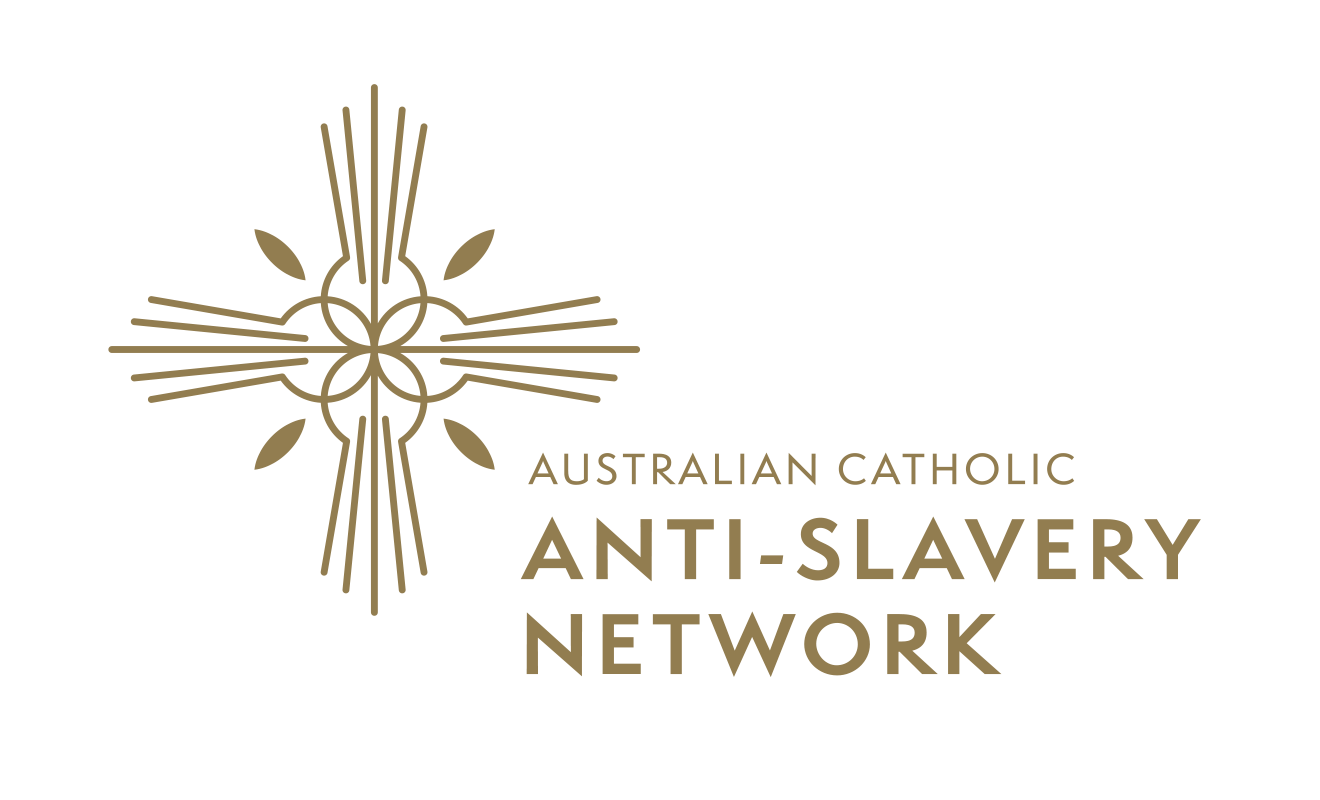UN International Day for the Abolition of Slavery 2 December
Image: Archbishop Anthony Fisher OP (Centre) with Senior Diocesan Finance staff at Sydney Catholic Schools for the UN Day Against Trafficking in Persons 2022.
Today is United Nations International Day for the Abolition of Slavery.
On this important day, we reflect on and respond to the rallying call of the Most Reverend Anthony Fisher OP Archbishop of Sydney in his recent video message “Addressing modern slavery together.”
“In 20 years, when as a global community, we look back on the progress that has been made on this issue. Will people ask, where was Australia? Will they say, Australia saw and acted?”
Australian Catholic Anti-slavery Network: A message to suppliers, 2022
Globally, Catholics have been called by Pope Francis to take action to end all forms of modern slavery.
Pope Francis inspired the United Nations Sustainable Development Goal 8.7 to eliminate modern slavery by 2030 and the Holy Father’s Laudato si’ goals have urged swift and unified global action to heal the earth and human society.
Modern slavery destroys personal freedom and violates the human dignity and inherent worth of every person.
Forced and child labour, human trafficking, debt bondage, deceptive recruitment and other forms of modern slavery impact millions of people worldwide with the majority of those affected living in the Asia-Pacific region.
Poverty, displacement, violence against women, the refugee crisis and a changing climate are some of the factors contributing to modern slavery risks both in Australia and abroad.
In Australia, the Modern Slavery Act (MSA) 2018 has made engagement with modern slavery by Catholic entities a very concrete and imperative reality.
The Australian Catholic Anti-slavery Network (ACAN) is leading the Catholic response in Australia through the ACAN modern slavery risk management program. ACAN is a demonstration of our faith being put into action across Catholic health and aged-care services, education providers, community services and investments.
These efforts by Modern Slavery Working Groups, executives, board members and business partners have strengthened the transparency and sustainability of Catholic organisations.
International days provide occasions to educate the public on issues of concern, to mobilise political will and resources to address global problems, and to celebrate and reinforce achievements of humanity.
ACAN is the largest anti-slavery collaboration of its kind in Australia focused on addressing modern slavery risks in supply chains and operations.
“In fact, we have not found any similar Catholic initiative anywhere in the world – not in Europe, North America or Asia. This is a great achievement and worth recognising on this day,” said John McCarthy KC, Chair of the Anti-slavery Taskforce in Sydney which facilitates ACAN.
“I congratulate the Bishops, Board Members and Executives of Catholic health and aged-care, education and universities, community and social services, finance and investment for their leadership, commitment and ongoing participation in ACAN.”
Through ACAN and its 51 participating entities, the task of understanding modern slavery risks and actions that can be taken to counter those risks has begun. Over the past eight weeks over 1000 suppliers of goods and services to ACAN entities have answered survey questions relating to 11 high-risk spend categories.
“No one has ever mapped this data before. Data is an important tool that ACAN entities can use to improve efficiency and create leverage to manage modern slavery and other risks,” says Alison Rahill, Executive Officer of the Anti-slavery Taskforce.
“The challenge is to engage suppliers to cooperate in these efforts and investigate their own supply chains. It’s an ongoing continuous improvement process that will mature year on year until it is Business as Usual.”
Mobilising political will in relation to modern slavery has always been an important feature of ACAN’s work. ACAN is represented on the Commonwealth Government’s National Roundtable on People Trafficking and Slavery and the Modern Slavery Act Expert Advisory Group.
Consultations are also taking place with the newly appointed NSW Anti-Slavery Commissioner, Dr James Cockayne.
“We should not view modern slavery as siloed from climate change, migration, development and labour relations,” says Jenny Stanger, Executive Manager of the Anti-slavery Taskforce.
“Policy outcomes in those areas will either enhance the effectiveness of current efforts to address modern slavery or undermine them. We must ensure those links are considered when proposals for reform are being made.”
In the last few months alone, ACAN has participated in the national conferences for Catholic Health Australia, the National Catholic Education Commission, Catholic Social Services Australia and international events organised by the Order of Malta, Centre for Migration Studies and German Catholic Bishops Conference to name a few.
The expertise of ACAN staff is equally sought out by the for-profit corporate sector such as the Minerals Council of Australia, Property Council of Australia, Bridgewater Associates, KPMG and others.
“We still have much work to do towards freeing the 50 million people around the world who are trapped in modern slavery. However, the Catholic Church in Australia is on the front foot and making a measurable difference through ACAN,” said John McCarthy.


